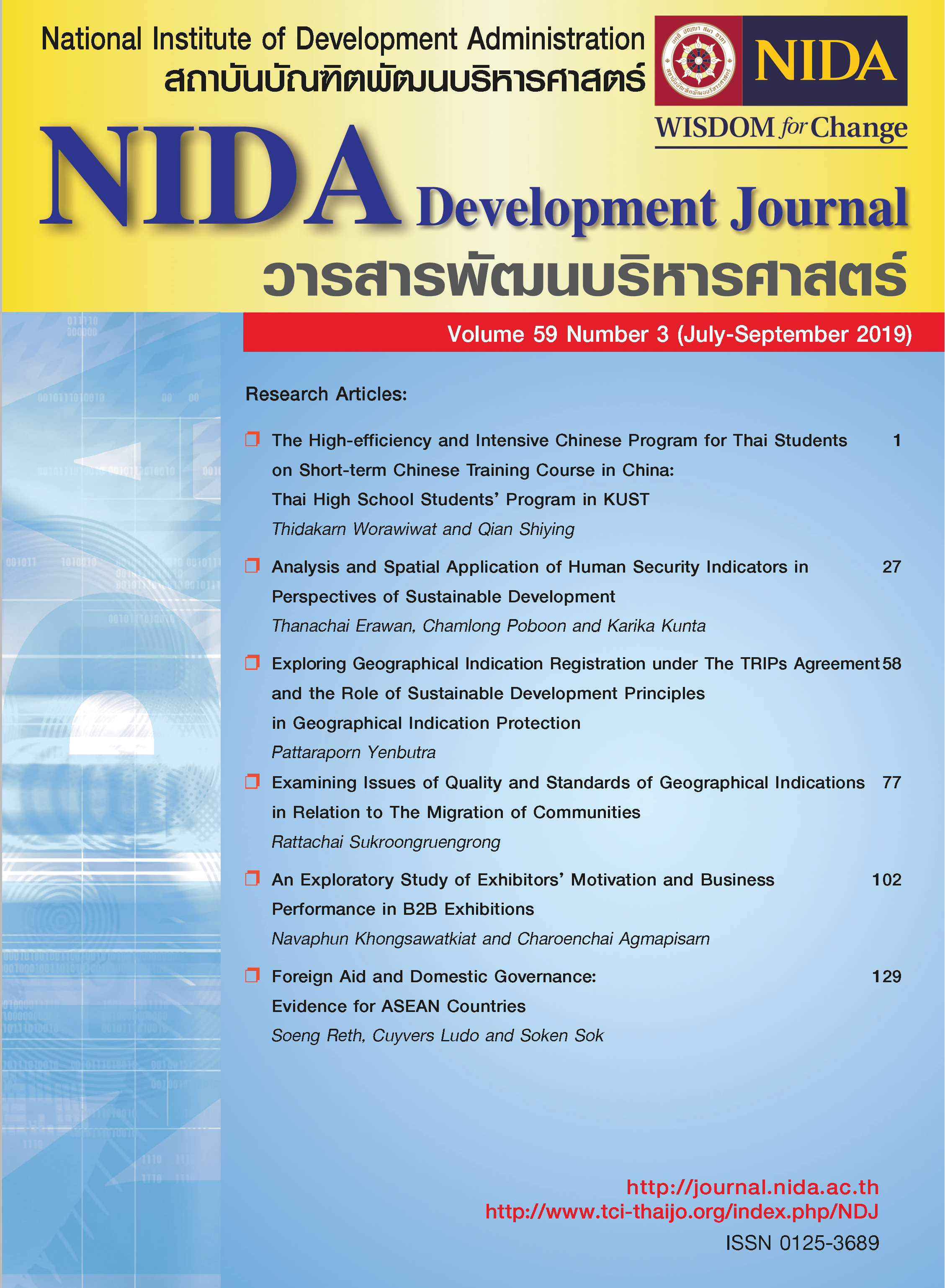Analysis and Spatial Application of Human Security Indicators in Perspectives of Sustainable Development
Keywords:
human achievement index (HAI), human security, spatial analysis, sustainable developmentAbstract
This study aims to analyze the implications of human security indicators and sustainable development, in perspectives of economic, social, and environmental aspects for investigating development opportunities in the study area,the Central-West region of Thailand. The Human Achievement Index (HAI) from the National Economic and Social Development Board (NESDB) was exploited as a based case of human security indicators for a mixed-method research in the study. The data collection was conducted by a purposive sampling method towards the Delphi technique, which 18 participants were invited to deliver their opinions as the panelists, prior to integrate the significant indicators with the spatial application, namely ArcGIS. This analysis exploited various statistical measurements, including Mean, Median, Mode, and Interquartile to pursue central tendency and implication levels of the data collected. The findings expressed a series of implications, which human security affect to sustainable development, for instance, the top three highest significant indicators in each perspective could be ranked, as follows: 1) economic security--family income, consuming debt, and poverty rate, 2) social security--unemployment rate, social insurance, and high school and vocational training opportunity, and 3) environmental security--serviceable main road, greenhouse emission rate, and house and land owner, respectively.The study also derived various indicators from the panelists via the Delphi technique, for example, sufficiency economic village, drug-trafficking case, immigration rate, medical personnel rate, and air quality index. Furthermore, the panelists contributed some recommendations, regarding ecology and creative tourism, local business mechanism, smart city, empirical indicator, multi-dimensions of social and environmental issues. Nevertheless, the study suggested that the political vote rate in the year 2016 should be dismissed from the HAI.
References
Camp, W. G. & Heath-Camp, B. (2009). Managing Our Natural Resources. (5th Ed.). New York: Delmar.
Dewulf, J. & Langenhove, H. V. (Eds.). (2006). Renewables-based Technology: Sustainability Assessment. West Sussex: John Wiley & Sons.
Dincer, I. & Rosen, M. A. (2007). Exergy: Energy, Environment and Sustainable Development. Amsterdam: Elsevier Science Publishers.
Doppenberg, J. & Aar, P. V. D. (2007). Biofuels: Implications for the Feed Industry. Wageningen: Wageningen Academic Publishers.
Field, A. (2014). Discovering Statistics Using IBM SPSS Statistics. (4th Ed.). London: SAGE Publications Ltd.
Gomez, O. A. & Gasper, D. (2020). Human Security: A Thematic Guidance Note for Regional and National Human Development Report Teams. United Nations Development Programme. Retrieved January 5, 2020 from http://www.hdr.undp.org/sites/default/files/human_security_guilgace_note_r-nhdrs.pdf
Harris, F. (Ed.). (2004). Global Environmental Issues. West Sussex: John Wiley & Sons Ltd. (pp. 21-44).
Lan, M. K., Tan, K. T., Lee, K. T. & Mohamed, A. R. (2009). Renewable and Sustainable Energy Reviews. Elsevier, 13, 1461.
McCoy, K. R. (2006). Resource Management Information Systems: Remote Sensing, GIS, and Modelling. (2nd ed.). Florida: CRC Press.
McPhail, K. (2012). Regulating for Rights and Sustainability: Biofuel in Malaysia. Sustainability Accounting. Management and Policy Journal, 3(2), 252-261.
Morse, S. (2004). Indices and Indicators in Development: An Unhealthy Obsession with Numbers. London: Earthscan.
Murai, S. (Ed.) (1995). Toward Global Planning of Sustainable Use of the Earth: Development of Global Eco-Engineering, The 8th Toyota Conference. Amsterdam: Elsevier.
Nakhon Prathom Provincial Governor’s Office, 2020). The 4-Years Development Plan of Nakhon Prathom Province (Year 2018-2021). Nakhon Prathom: Nakhon Prathom Provincial Governor’s Office. Retrieved March 15, 2020 from
http://www.nakhonpathom.go.th/files/com_news_develop_plan/2016-11_71a0e26cc1c1c8a.pdf
Office of National Economic and Social Development Board. (2008). National Sustainable Development Strategy: A Guidance Manual. Bangkok: Thailand Environment Institute.
Office of National Economic and Social Development Board. (2011). The 11th National Economic and Social Development Plan (Year 2012-2016). Bangkok: Office of Prime Minister.
Office of National Economic and Social Development Board. (2017). The 12th National Economic and Social Development Plan (Year 2017-2021). Bangkok: Office of Prime Minister.
Office of National Economic and Social Development Board. (2017). Human Achievement Index (Year 2017). Bangkok: Office of Prime Minister.
Office of National Economic and Social Development Board. (2018). The 20-Years National Strategy (Year 2018-2037). Bangkok: Office of Prime Minister.
Office of National Economic and Social Development Board. (2019). Human Achievement Index (Year 2019). Bangkok: Office of Prime Minister.
Privitera, G. J. (2019) Essential Statistics for the behavioral Sciences. (2nd Ed.). London: SAGE Publications Ltd.
Rowe, G., & Wright, G. (1999). The Delphi technique as a forecasting tool: Issues and analysis. International Journal of Forecasting, 15, 353–375.
Scheele, D. S. (2002). Reality construction as a product of Delphi interaction. In Korkmaz, H. E. & Erden, M. A. Delphi Study: The Characteristics of Democratic Schools. Journal of Educational Research. 107 (5), 365-373.
Scheibe, M., Skutsch, M., & Schofer, J. (2002). Experiments in Delphi methodology. In Korkmaz, H. E. & Erden, M. A. Delphi Study: The Characteristics of Democratic Schools. Journal of Educational Research. 107 (5), 365-373.
Seppelt, R. (2003). Computer-Based Environmental Management. Weinheim: Wiley-VCH.
Suphanburi Provincial Governor’s Office. (2020). The Annual Administration Plan: Suphanburi Province (Year 2020). Suphanburi: Suphanburi Provincial Governor’s Office.
Retrieved March 17, 2020 from https://ww1.suphanburi.go.th/files/com_strategic/2020-06_e25c982bf37b3e9.pdf
Torrance, N., Smith, B. S., Elliot, A. M.,Campbell, S. E., Chambers, W. A., Hannaford, P. C., & Johnston, M. (2010). Potential pain management programmes in primary care. A UK-wide questionnaire and Delphi survey of experts. Family Practice, 28, 41-48.
United Nations Conference on Environment and Development. (1992). Agenda 21. Rio de Janerio: United Nations.
United Nations Trust Fund for Human Security. (2019). Human Security at the United Nations. Retrieved July 11, 2019 from http://www.un.org/humansecurity
Downloads
Published
How to Cite
Issue
Section
License
Copyright (c) 2020 NIDA Development Journal

This work is licensed under a Creative Commons Attribution-NonCommercial-NoDerivatives 4.0 International License.





